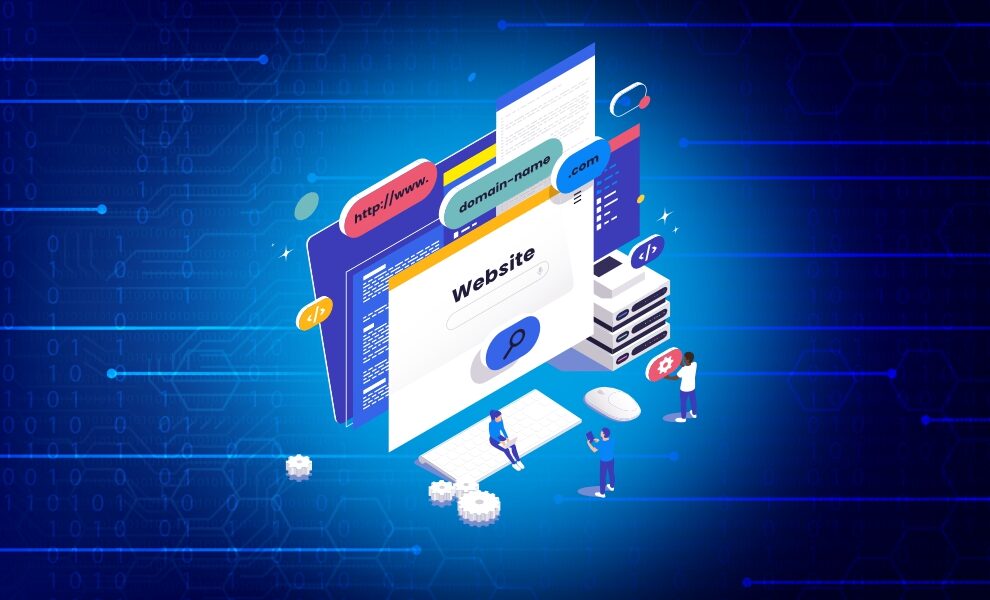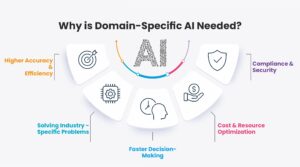Artificial intelligence (AI) is now no longer a distant future reality. It is already transforming industries with specialized solutions for specific requirements. Domain-specific AI, unlike general AI, is specifically meant to perform better in a certain area, with superior accuracy and efficiency. For healthcare to finance, corporations are using this technology to address intricate problems. The following are five sectors where this AI is creating a huge impact.
What is Domain-specific AI?
Domain-specific AI are systems that are designed to execute specialized functions in a specific industry or domain. In contrast to general-purpose AI (like ChatGPT or virtual assistants), which can respond to a broad set of topics. Domain-specific intelligence are trained dedicatedly for one particular domain, such as healthcare, finance, or manufacturing.
These AI models are trained on industry-specific data. They allow domain-specific intelligence to provide relevant and highly accurate solutions. For example:
- A healthcare AI might analyze medical scans to detect tumors.
- A financial AI will estimate stock market trends which is based on economic data.
- A manufacturing AI might optimize factory operations by predicting machine failures.
As they focus on one area, these AI systems perform better than general AI in their respective fields.
Why is Domain-specific AI Needed?
1. Higher Accuracy & Efficiency
General AI may struggle with complex industry-specific tasks. Domain-specific AI, however, is trained on relevant data, making it more precise.
2. Solving Industry-specific Problems
Different sectors face unique challenges. A one-size-fits-all approach can’t address them effectively. They provide customized solutions.
3. Faster Decision-Making
Businesses need quick, data-driven insights. Domain-specific AI processes industry-relevant information rapidly, helping professionals make informed choices.
4. Cost & Resource Optimization
By automating specialized tasks, this AI reduces manual effort and errors. This helps in better resource management and reduces operational costs.
5. Compliance & Security
Industries like healthcare and finance have strict regulations. Domain-specific AI ensures compliance by protecting sensitive patient data in medical AI systems and following financial laws in fraud detection algorithms.
Top 5 Industry-Specific Applications of AI
1. Healthcare: Improving Diagnostic and Treatment
The medical field has adopted AI as domain-specific to enhance patient care and reduce medical procedures. AI-based software processes data in large amounts to help physicians in diagnosis, treatment planning, and drug discovery.
For example, AI codes scan medical images like X-rays and MRIs with accuracy and are able to find abnormalities like tumors at their initial stage. IBM Watson Health is an example of AI in healthcare, helping oncologists to suggest custom-made cancer treatments based on patient history and medical literature.
2. Finance: Enhancing Transactions and Decision-making
The banking sector highly benefits from domain-specific AI, especially fraud detection, risk evaluation, and customer support. Banks and fintech companies use AI to monitor transaction patterns and identify suspicious activities in real time.
Artificial intelligence-based fraud detection systems, like Mastercard’s and PayPal’s, detect suspicious usage patterns and block unauthorized transactions. They learn to improve continuously with new data.
AI simplifies investment methods by studying different trends in the market and assuming stock movements. In addition, AI-powered chatbots in banking offer real-time customer support, managing questions on account balances, loan sanctions, and transaction records. This saves operational expenses and increases user experience. With domain-specific intelligence, financial institutions assure security, efficiency, and wiser decision-making.
3. Retail: Personalizing Customer Experiences
Retail companies are using domain-specific AI to improve customer interaction, inventory optimization, and operational efficiency. AI detects consumer behavior to make targeted suggestions, enhancing sales and customer satisfaction.
Amazon and Alibaba, the e-commerce leaders, use AI algorithms to recommend products on the basis of browsing history and shopping behavior. This improves the shopping experience and increases sales. Inventory management is also a field where AI is extremely useful.
In inventory management AI assumes demand patterns and retailers are able to keep optimal levels of inventory, cutting down on waste and storage expenses. For example, Walmart, uses AI-based systems to make accurate forecasts of product demand.
AI-based virtual try-on options enable customers to see products before buying them. Companies like L’Oreal and Warby Parker use augmented reality (AR) and AI to provide virtual makeup trials and eyewear fittings.
With this AI, the retail sector is growing more customer-focused and operationally efficient.
4. Manufacturing: Boosting Efficiency with Smart Automation
Manufacturing sectors are using domain-specific intelligence to reduce downtime, improve quality control, and automate operations. Predictive maintenance through AI supports factories in identifying equipment failures before they happen. This reduces costly disruptions.
Companies such as General Electric (GE) and Siemens use AI-enabled sensors to track equipment health in real-time. The system reviews vibration, temperature, and performance information to predict breakdowns. This allows timely maintenance.
5. Agriculture: Maximizing Farming Through Data Insights
There is a revolution of sorts in modern agriculture, and domain-specific AI is a key to maximizing crop output and resource use. AI-powered tools are helpful for farmers, as they help to track soil health, forecast weather, and automate harvesting operations.
Precision farming, fueled by AI, depends on drones and sensors to measure crop health in real time. Businesses such as John Deere use AI-powered equipment to check soil moisture levels and provide irrigation schedules, cutting water waste to zero.
AI helps in pest control, too, by detecting infestations early on through image recognition. For instance, firms such as Blue River Technology created smart sprayers that precisely spray weeds without touching the crops, cutting herbicide usage.
With domain-specific AI, agriculture becomes more sustainable, efficient, and resilient in feeding the world.
The Future is Specialized
In the future, AI will know your business as well as you do, like:
- Construction AI that predicts material stress points before building,
- Restaurant AI that adjusts recipes based on local taste preferences.
- Energy AI that balances power grids in real-time during storms.
The companies winning today aren’t just using AI; they are using AI that understands their specific challenges. That is the difference between keeping up and leading the pack.
Domain-Specific AI: The Smart Specialist
Domain-specific AI is important because it delivers targeted, efficient, and reliable solutions for industry-specific challenges. Unlike general AI, it understands particular fields, which leads to better performance and innovation.
As businesses and organizations adopt this AI, they gain improved accuracy, reduced costs, and the ability to drive smarter decisions. The future of AI lies in specialization, and industries that use these customized systems will lead the way in efficiency and growth.
Visit HiTechNectar to learn more information on artificial intelligence!
FAQ
Q1: What are the domains of AI and their applications?
Answer: AI domain includes robotics, machine learning, expert systems, natural language processing, and computer vision.
Q2: What is domain-specific?
Answer: It means a particular condition, set of variables, or factors that are applied to a particular industry or business.
You Might Also Like:
Top 10 Types of Website Localization Tools
Is Artificial Intelligence all Set to Disrupt Digital Marketing?



